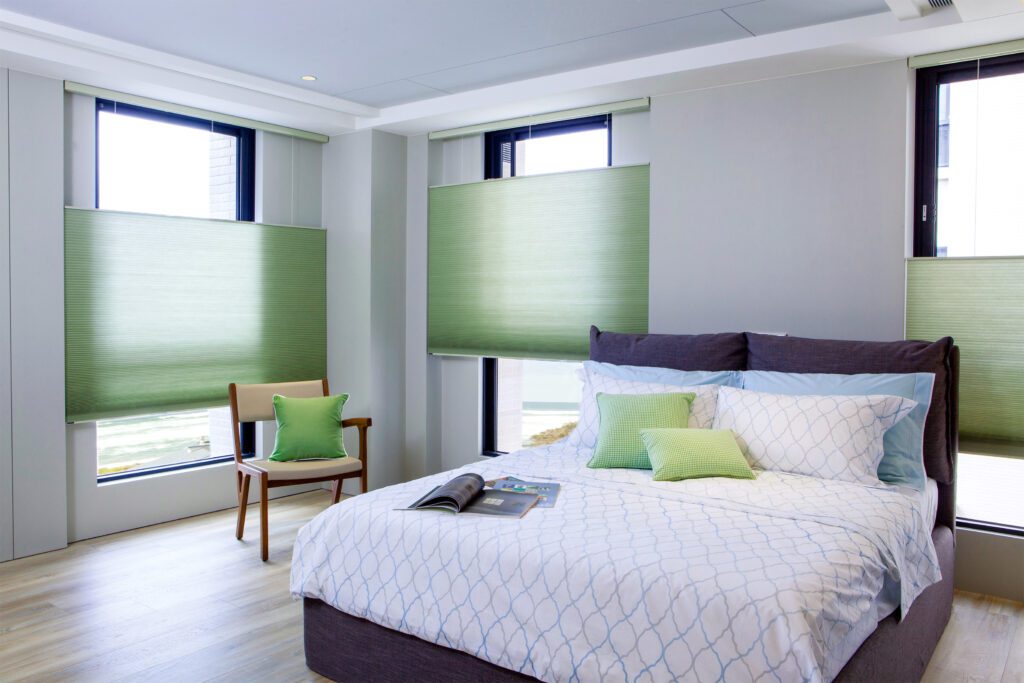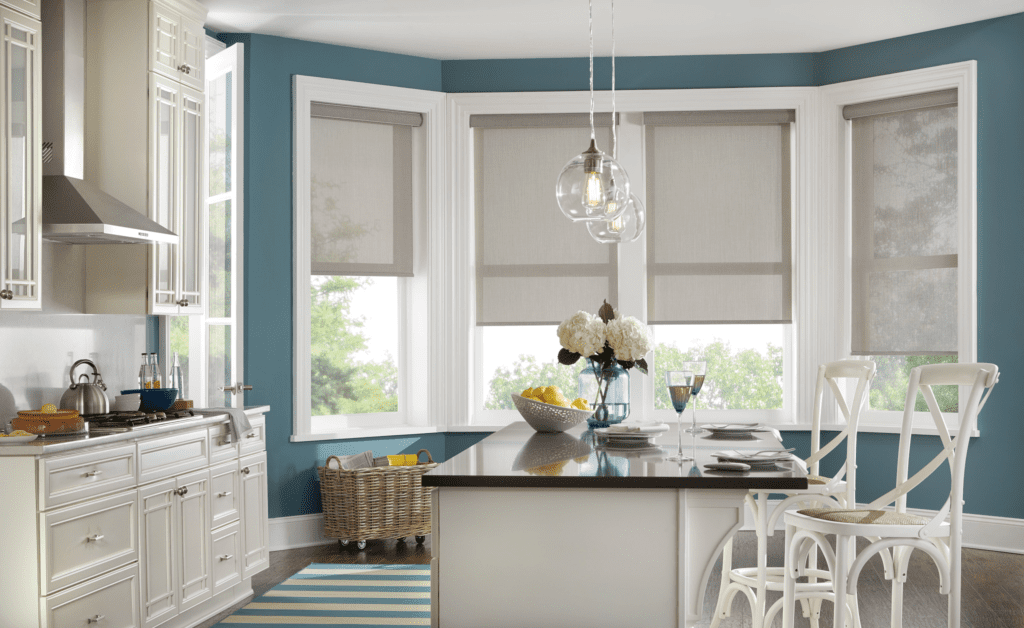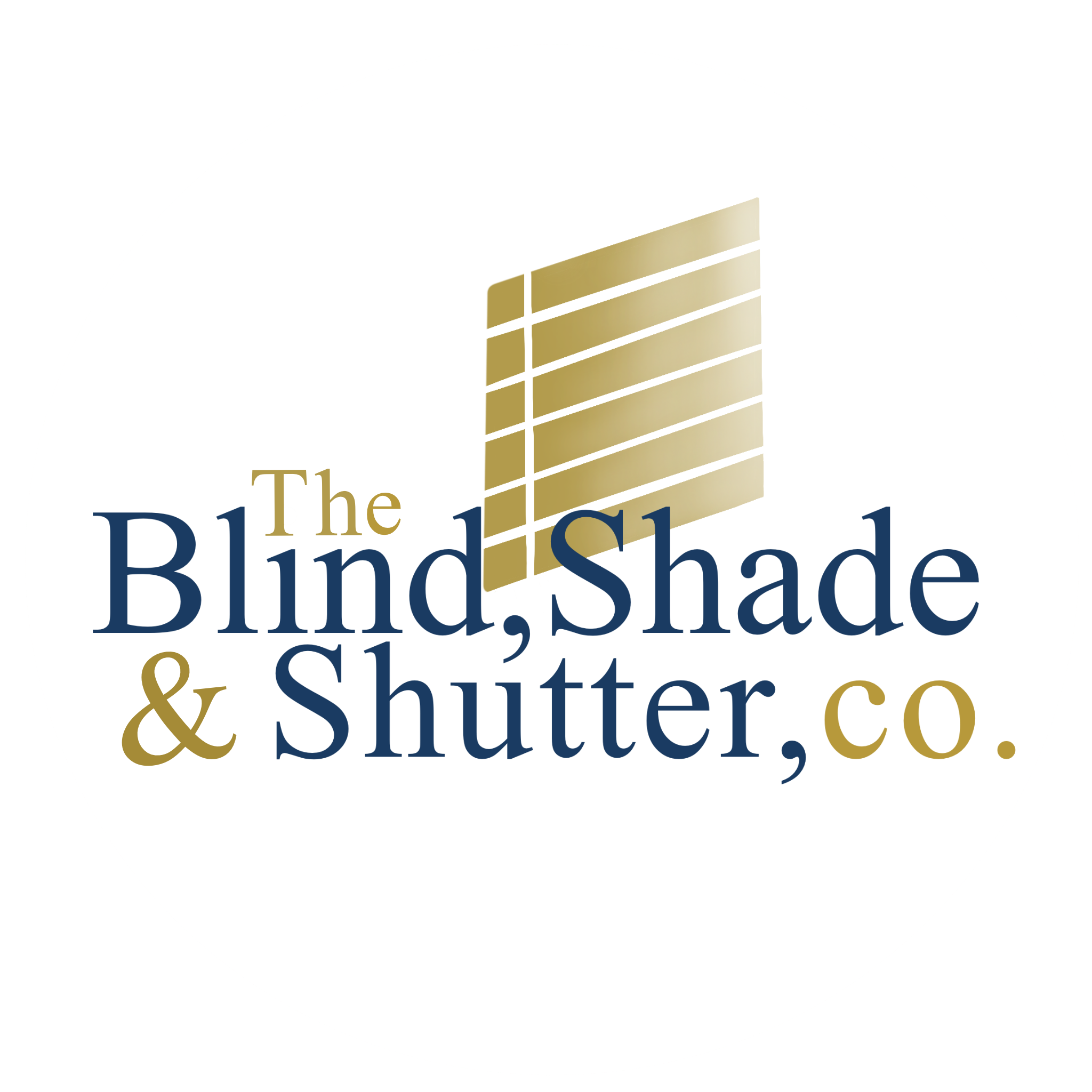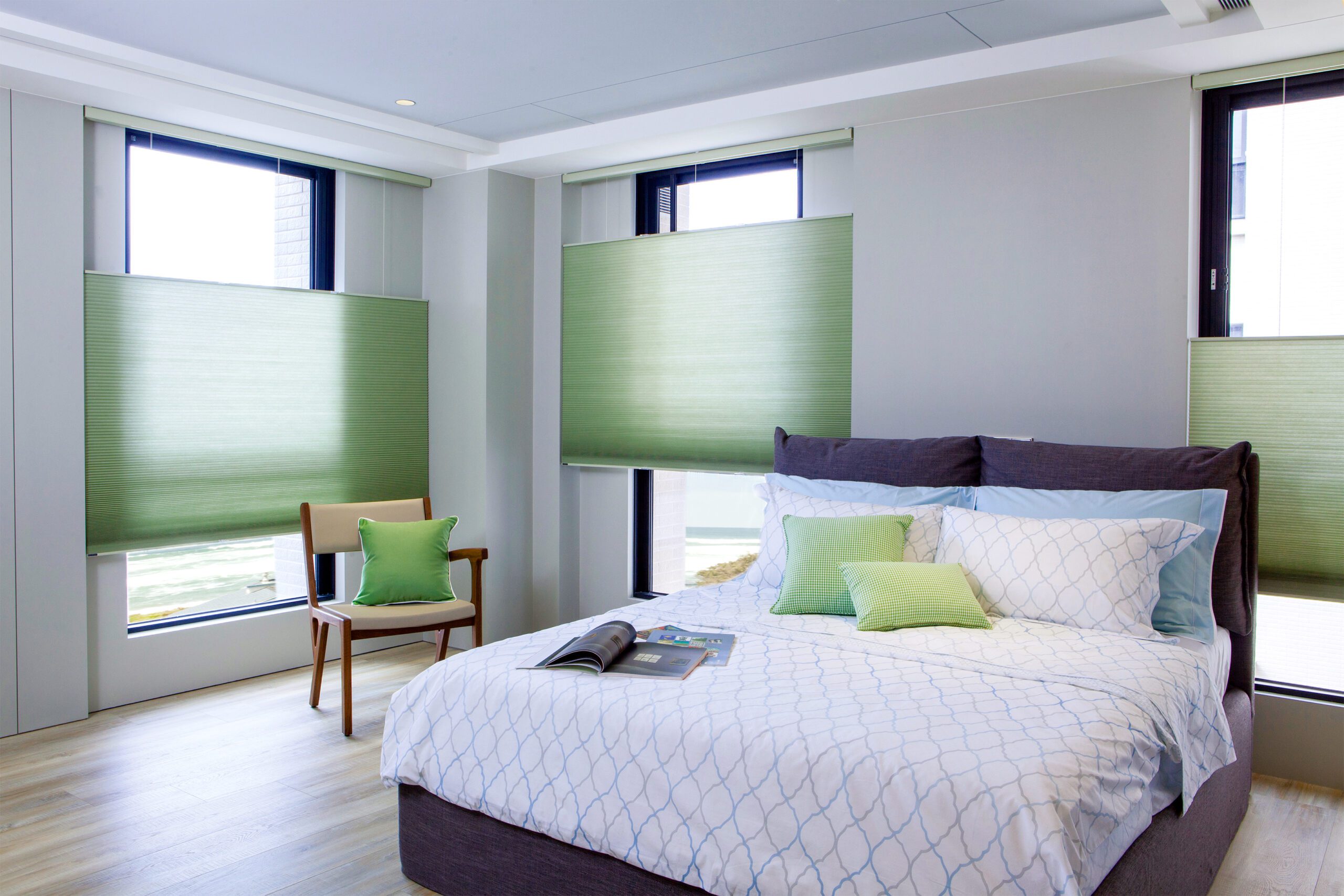When it comes to choosing the right window treatments, two of the most popular and versatile options are cellular shades and roller shades. Both offer distinct benefits in terms of design, energy efficiency, light control, and style. However, making the right choice for your home will depend on your specific needs, preferences, and the features each shade type brings to the table.
In this comprehensive guide, we’ll break down the pros and cons of cellular shades vs roller shades, comparing them side by side to help you determine which is the best option for your space.
What Are Cellular Shades?
Cellular shades, often referred to as honeycomb shades, are made from layers of fabric that form pleats, creating cells or pockets that trap air. This unique structure gives them excellent insulation properties, helping to regulate the temperature inside your home by keeping heat in during the winter and out during the summer. The key to their energy efficiency lies in their honeycomb-like design.

Key Features of Cellular Shades:
- Energy Efficiency: The honeycomb structure creates air pockets that insulate windows, significantly reducing heat transfer.
- Light Control: Cellular shades are available in various opacity levels, from sheer to blackout, giving you greater control over light and privacy.
- Variety of Styles: They come in a wide array of colors, patterns, and materials, making it easy to match them to any décor.
- Cordless Options: Many cellular shades offer cordless or motorized options, which are not only convenient but also safer for homes with children and pets.
What Are Roller Shades?
Roller shades are simple, sleek window treatments made from a single piece of fabric that rolls up and down using a tube mechanism. Their minimalist design makes them a great choice for modern or minimalist interiors. Roller shades are versatile and can be customized in a wide variety of fabrics, including light-filtering, blackout, and solar materials.
Key Features of Roller Shades:
- Sleek Design: Roller shades offer a streamlined, modern look that complements contemporary homes and clean aesthetics.
- Light Filtering Options: With roller shades, you can choose from light-filtering, room-darkening, or blackout materials depending on your preference.
- Easy Operation: Roller shades can be manually operated or motorized for effortless control.
- Space-Saving: When fully rolled up, roller shades take up minimal space, offering an unobstructed view of the outdoors.
Cellular Shades vs Roller Shades: Energy Efficiency
One of the most significant differences in the comparison of cellular shades vs roller shades lies in energy efficiency. Cellular shades are known for their superior insulation properties. The honeycomb design creates small pockets of air that help regulate indoor temperatures, which can lead to energy savings on heating and cooling bills. For homeowners in climates that experience extreme weather, this can be a major advantage.
On the other hand, roller shades typically offer less insulation. While they can block sunlight and reduce some heat during the summer months, they don’t provide the same level of thermal insulation as cellular shades. However, roller shades made from solar or blackout fabrics can still offer a degree of energy efficiency by reducing glare and preventing excessive heat from entering your home.
Winner in Energy Efficiency: Cellular Shades
If your priority is energy savings and temperature regulation, cellular shades come out on top in the cellular shades vs roller shades debate. Their ability to insulate windows makes them an excellent choice for those looking to enhance their home’s energy efficiency.
Cellular Shades vs Roller Shades: Light Control and Privacy
When comparing cellular shades vs roller shades in terms of light control, both options offer versatility, but the mechanisms and features differ.
Cellular shades are available in a range of opacity levels, from sheer to blackout, giving you more flexibility in managing natural light. Sheer cellular shades can diffuse light without sacrificing privacy, while blackout versions block light entirely, making them ideal for bedrooms or media rooms.
Roller shades, while also available in various fabrics, are typically associated with two main categories: light-filtering and blackout. Light-filtering roller shades allow soft light to enter the room, creating a pleasant ambiance, while blackout roller shades provide total darkness. However, roller shades tend to offer less nuanced light control than cellular shades, which may provide more options depending on your needs.
Winner in Light Control: Tie
Both cellular shades and roller shades perform well when it comes to light control, but cellular shades offer a slightly broader range of light-filtering options. Ultimately, the choice will depend on whether you prefer a more minimalist look or want additional insulation benefits along with light control.
Cellular Shades vs Roller Shades: Aesthetics and Design
Another key consideration in the cellular shades vs roller shades debate is how they look in your home. Each offers a unique style that can dramatically impact the overall design of a room.
Cellular shades are generally more textured due to their honeycomb structure, giving them a softer and more layered appearance. This makes them a popular choice for traditional or transitional interiors, where the goal is to create a cozy and inviting atmosphere. Cellular shades come in various colors and materials, allowing for customization, but their pleated look is a defining characteristic.
Roller shades, on the other hand, offer a clean and sleek appearance. They are often preferred in modern or minimalist spaces due to their smooth, streamlined design. The wide range of fabric options means you can customize roller shades to match the exact look and feel you’re going for, from neutral tones to bold patterns.
Winner in Design: Roller Shades
If you’re seeking a modern, minimalistic look, roller shades may be the better option in the cellular shades vs roller shades comparison. Their sleek design is ideal for contemporary spaces, while cellular shades may be better suited for more traditional or cozy interiors.

Cellular Shades vs Roller Shades: Durability and Maintenance
Durability and maintenance are essential factors when selecting window treatments, and the performance of cellular shades vs roller shades can vary depending on the materials used.
Cellular shades are typically made from polyester, a durable material that can withstand wear and tear. However, because of their pleated design, they may be more prone to dust accumulation. Fortunately, cleaning cellular shades is relatively easy. They can be dusted or vacuumed with a brush attachment to keep them looking new.
Roller shades, especially those made from vinyl or treated fabrics, tend to be easier to clean and maintain. A simple wipe with a damp cloth is usually enough to remove any dust or dirt. Roller shades are also less likely to show wear and tear since they don’t have pleats or folds where dust can settle.
Winner in Durability: Roller Shades
While both options are durable, roller shades may have a slight edge in the cellular shades vs roller shades comparison because they are easier to clean and maintain, especially in high-traffic areas or homes with pets and children.
Cellular Shades vs Roller Shades: Customization Options
In the cellular shades vs roller shades debate, both offer a high degree of customization. You can choose from various colors, patterns, and fabrics, allowing you to match your window treatments to your home’s interior design.
Cellular shades can be customized in terms of pleat size (small or large), fabric opacity, and color. You can even opt for top-down/bottom-up designs, which allow you to lower the shade from the top or raise it from the bottom, giving you even more control over light and privacy.
Roller shades also offer a wide range of customization options, including the type of fabric (light-filtering, blackout, solar), patterns, and even the roller mechanism itself. For example, some roller shades come with decorative valances or cassette covers, adding a touch of elegance to their simple design.
Winner in Customization: Tie
Both cellular shades and roller shades are highly customizable, so this category ultimately depends on your personal design preferences and the specific needs of your space.
Cellular Shades vs Roller Shades: Cost
Finally, when comparing cellular shades vs roller shades, the cost is a crucial factor to consider. The price of window treatments can vary significantly depending on the size of the window, the type of material used, and additional features like motorization or special finishes.
Cellular shades tend to be more expensive than roller shades due to their complex construction and insulation properties. If you’re looking for a high-end option that offers energy efficiency, cellular shades are a worthwhile investment, but they may come at a higher price point.
Roller shades, by comparison, are generally more affordable. Their simple construction and wide range of fabric choices make them a budget-friendly option without sacrificing style or functionality.
Winner in Cost: Roller Shades
If cost is a primary concern in your cellular shades vs roller shades decision, roller shades offer a more affordable solution while still providing a stylish and functional window treatment option.
Conclusion: Cellular Shades vs Roller Shades – Which Is Right for You?
Both cellular shades and roller shades are excellent window treatment options, but each has its own unique advantages depending on your needs. To recap the key points:
- If energy efficiency and insulation are your top priorities, cellular shades are the better choice.
- For a sleek, modern look and easy maintenance, roller shades come out on top.
- In terms of light control, both options offer versatility, though cellular shades may provide slightly more flexibility.
- For cost-conscious homeowners, roller shades are typically the more affordable option.
Ultimately, the decision between cellular shades vs roller shades comes down to your personal preferences and the specific requirements of your space. Whether you prioritize energy savings, design, or budget, both types of shades can enhance the comfort and beauty of your home.
At The Blind, Shade & Shutter Co., we offer a wide selection of both cellular shades and roller shades to suit every style and need. Contact us today to schedule a free in-home consultation and find the perfect window treatments for your home.
Contact us today for a free in-home consultation and let us help you transform your space with beautiful, functional, and custom window treatments and elevate your home.
The Blind, Shade & Shutter Co.
Showroom: Hamilton, VA
Phone: (703) 669-2400
Website: info@blindsco.com
Hunter Douglas Certified Dealer


Comments are closed